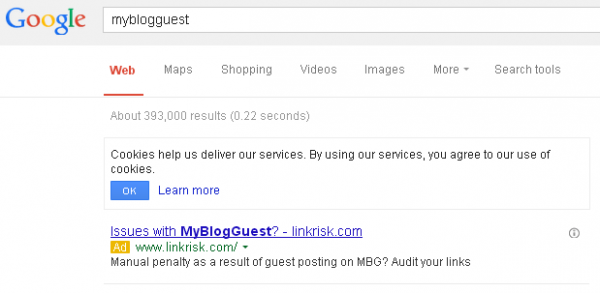There has been some controversy circulating amongst the SEOs and internet marketers this week regarding the penalisation of My Blog Guest. Google sunk them, along with the entire community of publishers trapped inside, as a large number of the forum members came forward to report receiving manual penalties for their own websites. But there’s a problem when you just burn everybody that gets too close to the fire. Especially when you’re burning a community of thousands of participants. It can be hard to decipher the genuine bloggers from the SEO spammers. And that’s where I think the problem lies.

My Blog Guest may not be ranking for their brand terms anymore, but Link Risk are certainly cashing in on the drama.
Whether you agree or disagree with the Google web spam team’s decision to penalise My Blog Guest, you can’t deny that guest blogging is still valuable, whether the intentions behind it are aimed at SEO or online marketing.
1) Make sure that the article written is valuable
If the article is irrelevant to the site, has been covered to death already, or isn’t appropriate to the blog’s regular audience, then what’s the point? It provides no value to the blog, and its sole purpose is obviously just to gain a backlink. Those days are gone. Google’s shone a light on guest blogging for link building, and all the cockroaches hiding behind it have been left scurrying for cover. To avoid being used by such cockroaches, ensure that any new article is uniquely written and that the author hasn’t just spun the same article a dozen times for a dozen different blogs. Google Authorship can come in handy for this, as you can see what other blogs the author has contributed to and check out the general quality of their writing.
You share your own content on your own property via Facebook and Twitter, but if you don’t promote your guest posts the same way then it implies that you’re ashamed of it. Whether it’s an article that you’ve written for someone else’s blog, or whether it’s an article someone else has written for your own blog, if you’re not proud enough of the content to share it with your own followers then you shouldn’t be publishing it.
2) Make sure the blog the article is written on is valuable
A good question to ask yourself is: would I be proud to be featured on this website? If the answer is no, then why do you want your writing published on this website anyway?
Some blogs seem to have good authority and even publish content daily. This might be an extremely tempting opportunity, to gain a backlink from such a good authority website. But some webmasters are just awfully good at ranking their blog without actually having a legitimate readership. Where is their social following? Where is their engagement? Alarm bells should sound all around if their audience is nowhere to be found….
3) Choose your guest authors wisely
Remember that the authors that you choose to publish on your site are representing your brand and your values. If you want your blog to have any credibility, you have to work toward building connections and long lasting blogging relationships with your guest authors. Not just drive-by SEOs, who drop their 500 words and a couple of links and then you never hear from them again.
4) Treat your guest bloggers with respect
If you value your guest author, then surely they’re entitled to their own author account and bio instead of a general “guest author” one, so that they receive the proper credit that they deserve for their hard work. Not only does it show the guest blogger that they are more than just content to you, but it also makes it easier for them to become a regular guest blogger for you in future. It shows that you trust the quality of the work they produce enough to have it published onto your blog more than once.
You could even take this one step further and actively engage with articles they’ve written for other blogs, to show that you support them outside of your own network. This is how you build real online relationships.
5) Treat your readers with respect
Go back to your article once it’s published to interact with your readers in the comments section. If people have taken the time to leave feedback or start a discussion then you should take the time to interact with them back, even if it isn’t on your own website. If you don’t, you are only making yourself look bad. Likewise, if a guest writes an awesome post for your blog (and why would it not be? Otherwise you shouldn’t have published it) then you should at least leave a comment expressing your gratitude toward them.
6) Find alternatives to guest articles
Perhaps instead of just posting articles from guest bloggers, ask whether they would like to participate in an interview, discussion or just a casual conversation based on that topic. And then publish that instead! Show your readers that you are not just a BlogBot that hits the big red button saying “PUBLISH” whenever someone emails you with a guest post proposal. It adds a human touch by offering more than one view on a topic too.
You could also perhaps ask your regular guest authors whether they would want to contribute a chapter each to a guide or eBook for the blog, which can then be published in HTML format and as a downloadable PDF. That way each author can contribute their own expertise on a subject, and work alongside each other toward a bigger creative project, hopefully generating more attention toward it via all of the contributors’ means and building each person’s authority on their subject.
7) Think before you Follow
Only allow Followed links that you can personally vouch for and, if possible, avoid using keyword rich anchor text. Each Followed link is an endorsement from your website. If you won’t endorse the outbound link then maybe you shouldn’t be allowing the link at all in the first place. And if how you do or don’t link to something is such an issue with your guest author, or if you don’t trust your guest blogger enough to link appropriately, then maybe they shouldn’t be publishing content on your blog anyway. The exposure from the borrowed audience should be worth more than the backlink itself.
8) And of course, don’t leave your blog URL lying around on guest blogging forums….
Well, at least not any more anyway. Matt Cutts might get mad that no one took his blog post seriously, and take that out on you.



I agree with all the points you suggested above, but the issue is not always detectable sometime, we play right yet Google thinks otherwise. I read complaints from webmaster or blogger who their website penalized without them noticed what’s wrong.